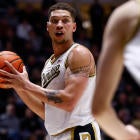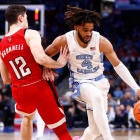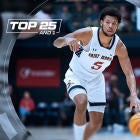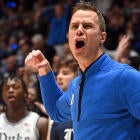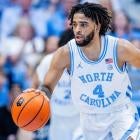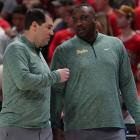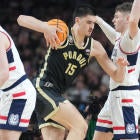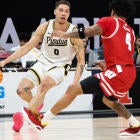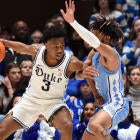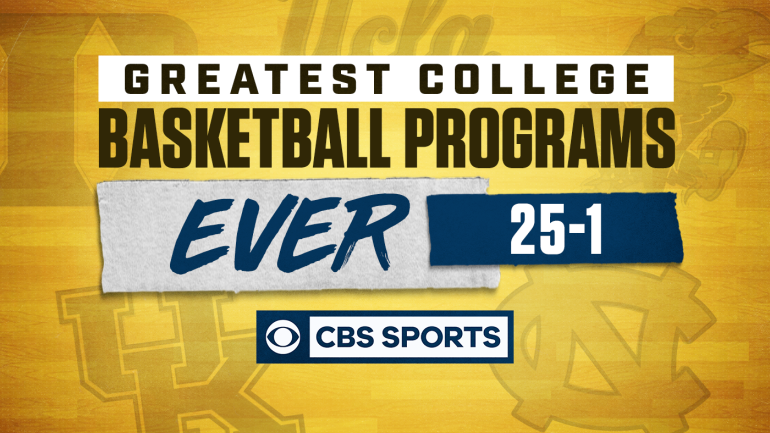
The big reveal is here. Below are the 25 most successful programs in men's Division I college basketball since the advent of the NCAA Tournament in 1939. In this longest of offseasons, I was sparked to research the history of the sport, and in doing so began to assemble a list of the greatest schools. From there, I wanted to provide a ranking built much more on statistics and achievements than broad perception or subjective rankings.
CBS Sports' assembly of the 68 best programs in history (read the ranking of Nos. 68-51 and Nos. 50-26) was objectively driven by the data. Still, I did need to come up with categories and assign values to them. I relied upon wins and losses, NCAA Tournament success, conference dominance, NIT titles -- because it was a significant tournament for decades, and even still is a marked achievement in today's age -- and the cultivation of NBA talent. Those categories' points were added up and the master order was determined.
- NCAA Tournament championships (20 points)
- Final Four appearances without a national title (10 points)
- Regular-season titles (5 points)
- Elite Eights without making the Final Four (3 points)
- NIT titles (3 points)
- NCAA Tournament bids (2 points)
- Wins (0.5 points)
- Losses (-0.5 points)
- Wins over ranked opponents (0.5 points)
- Weeks ranked (0.1 point)
- Top-10 NBA picks (5 points)
- 11-30 NBA picks (3 points)
- 31-60 NBA picks (1 point)
I relied on data from the NCAA record book, Sports Reference, RealGM.com, CollegePollArchive.com, Stats Inc., school record books, KenPom.com and ESPN's College Basketball Encyclopedia. CBS Sports ace researcher Andy Tulin provided all data on teams' wins over ranked opponents. The project was finished in early November, prior to the 2020 NBA Draft and the release of the preseason AP Top 25 poll. Those data points were not factored in. This is from 1938-39 through the 2019-20 season.
Drumroll, please. We proudly present the best programs in college basketball.
Greatest College Basketball Teams Ever: Nos. 26-50 | Nos. 51-68
25. Oklahoma State
Record since 1938-39: 1,449-939 | Regular-season titles: 14
NCAA Tournaments: 28 | Final Fours: 6
Weeks ranked: 269 | Top-60 NBA picks: 23
POINTS: 626.4
Yeah, the list feels right starting with the Pokes. Oklahoma State is behind in the all-time series with Bedlam buddies Oklahoma, but the totality of the resume leaves little doubt that this is the better program on the whole. The Cowboys also narrowly edged out Big 12 brethren Texas to crack the top tier, lifted in part because of two national titles, four additional Final Four appearances, then six more Elite Eight showings that don't include the previous six Final Four runs.
OSU was Oklahoma A&M (until 1957) when Hank Iba made history by becoming the first coach, and thus A&M the first team, to win back-to-back national titles in 1945 and '46. Iba is a giant. He coached from 1934-70 (653-317), and he was so successful that it's surprising to realize that the late, great Eddie Sutton still trailed Iba by 285 wins when he left the program in 2008. Bob Kurland was the star of those early teams, a 7-footer at a time when college basketball had very few people 7-feet playing. Oklahoma State had studs like Byron Houston, Brooks Thompson, Bryant Reeves, Desmond Mason, Tony Allen, Marcus Smart and James Anderson, but Kurland is the only consensus All-American in school history. Perhaps Cade Cunningham changes that in 2021. And if you've ever wondered who the "Gallagher" in Gallagher-Iba Arena is, Ed Gallagher was as big a deal to Oklahoma State wrestling as Iba was to OSU hoops.
24. Temple
Record since 1938-39: 1,491-862 | Regular-season titles: 18
NCAA Tournaments: 33 | Final Fours: 2
Weeks ranked: 157 | Top-60 NBA picks: 25
POINTS: 631.2
The Owls comfortably sit sixth -- sixth! -- in all-time victories with 1,940, only trailing Kentucky, Kansas, North Carolina, Duke and Syracuse. This should not be a surprise ranking for the Temple fans who know their stuff. TU hoops is one of the oldest institutions in basketball, having played its first game in 1894. Harry Litwack won 373 games (1952-1973), Don Casey added 151 more (1973-1982) and then John Chaney looked over this program and brought it to a heightened level of respect and consistency from 1982-2006, winning 516 games and making the Elite Eight five times, heartbreakingly never breaking through to the Final Four. He got to the NCAAs 17 times and won eight A-10 titles.
After Chaney, Fran Dunphy serviceably kept Temple competitive, but the program dipped a notch or two. The Owls' trips to the Final Four came long ago under Litwack, in '56 and '58. Temple also just missed the cut for receiving national-championship credit; it won the Helms/NIT championship in 1938. Until earlier this decade, Temple won more Big 5 titles than any school, but Villanova has since surpassed it. The Owls count Bill Mlkvy (the Owl Without a Vowel) and Guy Rodgers as their consensus All-Americans. Mlkvy was the No. 4 draft pick in 1952, played one season, went into the Armed Forces and became a dentist. But oh: he once scored 54 straight points in a game, a record that will never, ever, ever, ever be broken. Other classic Owls include Mark Macon, Tim Perry, Eddie Jones, Aaron McKie (now the coach) and Pepe Sanchez.
23. Notre Dame
Record since 1938-39: 1,478-861 | Regular-season titles: 1
NCAA Tournaments: 36 | Final Fours: 1
Weeks ranked: 378 | Top-60 NBA picks: 42
POINTS: 643.3
Yet another case of a school known overwhelmingly for its football but in fact it's damn good in basketball as well. Digger Phelps and Mike Brey can take the lion's share of the credit for that. Phelps bested Johnny Dee, who won 116 games, taking over ND and going 393-197 before exiting in 1991. Phelps coached program legends such as John Shumate, Adrian Dantley, Orlando Woolridge, Kelly Tripucka, John Paxson and LaPhonso Ellis. The greatest player of all, Austin Carr, played from 1968-71 and is on the short list of best college players in history. He averaged 34.6 points in his career.
The Fighting Irish were permanently put on the college hoops map on Jan. 19, 1974, when UCLA's 88-game winning streak was broken by Phelps' team -- a 71-70 Irish victory -- dishing a young Bill Walton the first loss of his college career. Interestingly, Notre Dame bookended defeats of UCLA, the Bruins' most recent loss to this one coming in January 1971. And it was during that season, less than a month later, that Notre Dame was defeated by Fordham who, get this, was coached at the time by Phelps. The program has 15 wins over undefeated and/or No. 1-ranked teams. Here's a huge ND stat: eight consensus All-Americans since 1939 (Leo Klier, Bill Hassett, Kevin O'Shea, Carr, Shumate, Dantley, Troy Murphy and Jerian Grant). A note on Brey: he's the winningest coach in school history (437-233) and has taken the Irish to 12 NCAA tourneys with two Elite Eight runs and kept the program competitive in a loaded, 15-team ACC.
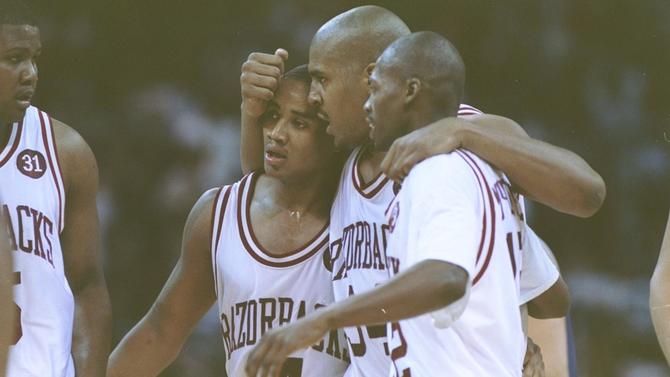
22. Arkansas
Record since 1938-39: 1,448-891 | Regular-season titles: 16
NCAA Tournaments: 32 | Final Fours: 6
Weeks ranked: 266 | Top-60 NBA picks: 23
POINTS: 647.1
This ranking, this ranking right here. This is what will revitalize but frustrate Razorback fans. Because the cruel truth is that Arkansas hasn't been to the Sweet 16 since 1996. Arkansas hasn't been operating like a top-25 program this century. Eddie Sutton or Nolan Richardson worked the sideline in Fayetteville from 1974-2002, and in that 28-year period had the Hogs at a top-25 level almost annually. Prior to that it was mostly an up-and-down go of it, though Glen Rose did bring Arkansas to a regional semifinal in 1958. Otherwise, just one tournament appearance between 1950 and 1977.
Your Arkansas players to know: John Adams, Sidney Moncrief, Darrell Walker, Joe Kleine, Oliver Miller, Todd Day, Corliss Williamson, Scotty Thurman, Joe Johnson, Bobby Portis. The peak came in 1994, when Arkansas won the national title and for the first time in history a sitting United States president attended the Final Four. Richardson's 40 Minutes of Hell tactic made Arkansas one of the 10 best programs of the mid-1990s, paced by Williamson and Thurman. The title was the apex, but Arkansas made two other Final Fours under Richardson and averaged nearly 29 wins over a seven-year span from 1988-1995.
21. Western Kentucky
Record since 1938-39: 1,541-834 | Regular-season titles: 28
NCAA Tournaments: 23 | Final Fours: 1
Weeks ranked: 111 | Top-60 NBA picks: 30
POINTS: 656.6
This lands as the last quasi-surprise on the list. Kentuckians of a certain age won't be shocked to see WKU respected here, but it's time to educate the rest. Fewer weeks ranked than anyone in the top 36, but the Hilltoppers are No. 16 on the all time wins in the sport and have won 28 league titles to go along with 30 NBA picks, which is a number that surprised even me. WKU has traversed the Ohio Valley to the Sun Belt to Conference USA, making the Elite Eight in 1940 (in an eight-team field) and the Final Four in 1971, an appearance that was later vacated.
That 1970-71 unit had Jim McDaniels (29.3 ppg), whose agreement to sign a pro contract ultimately had the Final Four run taken off the books. McDaniels and Clem Haskins (1967) are WKU's two consensus All-Americans, while Courtney Lee matched McDaniels' mark for points leader: each finished their career with 2,238. In total, 30 Western Kentucky players have earned first, second or third team All-American status. The interesting aspect about WKU is, due to the fact it's never been in a big conference, it's had so much more coaching turnover than just about any team in the top 50. E.A. Diddle is the exception: he coached from 1922-64, won 759 games and is (just maybe?) the second greatest basketball coach in the history of Kentucky college hoops.
20. Georgetown
Record since 1938-39: 1,420-868 | Regular-season titles: 11
NCAA Tournaments: 30 | Final Fours: 5
Weeks ranked: 397 | Top-60 NBA picks: 30
POINTS: 663.7
From here on out, it's bona fide powerhouses. The Hoyas defined the 1980s more than any other college program, the sport's top team in its top decade. It was a nondescript program from 1906 until the early 1970s, making the NCAA Tournament only once, when it was runner-up in 1943. A 10-time winner of the Big East regular season championship, Georgetown remains a program with massive national appeal thanks to what John Thompson Jr. built it up to be, which was a highly respected, highly intimidating, irrepressibly proud style of basketball dubbed "Hoya Paranoia." Georgetown won just one title, in 1984, but from 1982-1987 it was one of the best teams college basketball had to offer.
Your consensus All-Americans to come out of Georgetown: Sleepy Floyd, Patrick Ewing, Reggie Williams, Alonzo Mourning, Allen Iverson, Otto Porter Jr. Other greats include Dikembe Mutombo, Mike Sweetney, Jeff Green and Roy Hibbert. Few schools have had as many great college big men as Georgetown. Ewing, easily the best player in school history, is now the coach and remains as associated with Georgetown as he is with the New York Knicks. That's a rarity for someone who became a Hall of Fame NBA player. Like a few other programs spread throughout this list, Georgetown lost two full seasons due to World War II (1942-44).
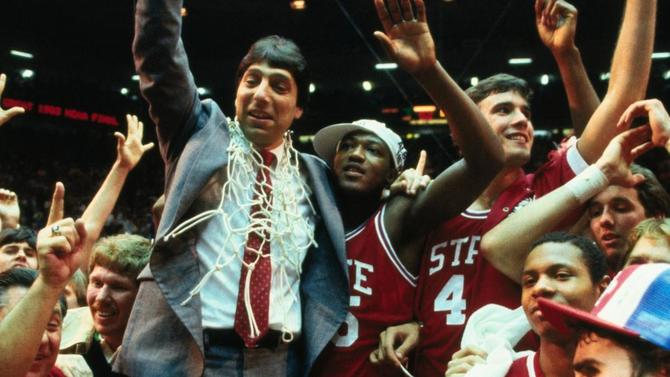
19. North Carolina State
Record since 1938-39: 1,456-874 | Regular-season titles: 7
NCAA Tournaments: 27 | Final Fours: 3
Weeks ranked: 346 | Top-60 NBA picks: 38
POINTS: 671.6
Two national titles, four other Elite Eight pushes and 13 appearances in a Sweet 16. You know the two Research Triangle neighbors posted below, predictably ranked much higher than the Wolfpack, but NC State fans, I ask you bask in this. You have one of the best programs in college basketball history and the numbers bear that out. Twenty-seven Big Dance bids, and it would be more if the tournament wasn't auto-bid-only up until the mid-1970s. NC State is involved in one of the most famous cases of tourney snubbing: the 1972-73 team went 27-0 and did not play in the Dance because the school was on probation. The following year, NC State beat a four-loss Maryland team for the second straight season in the ACC title game. That wound up being the latest and final case of a really good team being shut out of the NCAA tourney, opening up the at-large process we all know today.
The legendary 1973-74 team bounced UCLA out of the Final Four, making '74 the first year since '66 that UCLA didn't win it all. David Thompson, one of the top 10 college players ever, a three-time consensus All-American, played for State and put the program on the national map under Norm Sloan. (Sam Ranzino in 1951 and Ronnie Shavlik in 1956 are NCSU's two other consensus A-As.) The best coach in school history? It's a close three-horse race, really. Jim Valvano leading sixth-seeded NC State to the '83 championship is the peak Wolfpack moment, but Valvano won 209 games to Sloan's 266 and Everett Case's 377. The Case years (1946-64) are heralded in part because NC State was a superior program to North Carolina and Duke for much of his tenure. This program has 188 wins over ranked opponents and has won 17 league tournaments. State fans are hoping Kevin Keatts can, in time, cement himself as the next great State coach, the person who brings the Wolfpack back to the Final Four.
18. Michigan
Record since 1938-39: 1,252-847 | Regular-season titles: 10
NCAA Tournaments: 29 | Final Fours: 8
Weeks ranked: 417 | Top-60 NBA picks: 52
POINTS: 699.7
The swaggiest team in college basketball history defined an era, ushering in college basketball in the early 1990s and keeping it competitive with the Jordan-bolstered NBA. Chris Webber, Jalen Rose, Juwan Howard, Jimmy King, Ray Jackson: the Fab Five. Freshmen who kept Michigan top-10 good a few years after, oh hello, this program won the national championship in 1989. (Its only NCAA title.) Michigan's been playing college basketball since Jan. 9, 1908, and the results are undeniable. Yet again we have a school so much more known for its football team (football: kind of a huge thing in this country) but it's nearly as good in basketball. Michigan won 209 games under Johnny Orr and made multiple deep tournament runs in the 1960s and '70s. Bill Frieder won 189 more games -- before Bo Schembechler canned him prior to the start of the 1989 NCAA Tournament, when it became known Frieder had a handshake deal to take the Arizona State job after the season.
Steve Fisher took over, won it all in '89, but booster rulebreaking eventually wound up costing Michigan a lot of wins in the record books. Then John Beilein brought the Wolverines to two Final Fours and returned U-M to top-25 status in the sport in the past 10 years. It's not the best program in the Big Ten but it's capable of being the best program as frequently as any other team. Consensus All-Americans: Cazzie Russell, Rickey Green, Gary Grant, Chris Webber, Trey Burke. An onslaught of NBA picks beyond that, with Rudy Tomjanovich, Campy Russell, Roy Tarpley, Glen Rice, Rumeal Robinson, Robert Traylor, Jamal Crawford, Tim Hardaway Jr., Nik Stauskas and Caris LeVert lead that list. Rice's 184 points in the '89 NCAAs remains a tournament record. Russell is the best player in program history, the only two-time consensus All-American and someone who finished his career with 27.1 points per game.
17. St. John's
Record since 1938-39: 1,433-780 | Regular-season titles: 14
NCAA Tournaments: 30 | Final Fours: 2
Weeks ranked: 291 | Top-60 NBA picks: 42
POINTS: 722.6
The Johnnies rank seventh in all-time victories and 17th in win percentage -- but have fallen from No. 10 to No. 17 in 11 years' time. Lou Carnesecca turned a Queens-based basketball outfit into a Big East power in the 1980s, and we'll get to that in a minute, but St. John's was consistently good in the 1950s, '60s and '70s, recruiting in local talent on the regular to keep the school competitive in the Metro New York conference and as an independent from 1963-76. In the 1930s and 1950s, Joe Lapchick set the standard (334-130). Carnesecca's first tenure ran from 1965-70 and ended with an NIT or NCAA run each season; the late 1960s was when the NCAA Tournament really overtook the NIT in prestige, so this was still a legitimate run.
Carnesecca returned in 1973 and for the next 19 years had New York City caring about college basketball nearly as much as it did about the Knicks. St. John's played in the postseason every year under Carnesecca and won at least 20 games in 18 of his seasons. The 1984-85 team made the Final Four with Chris Mullin, Mark Jackson, Bill Wennington and Walter Berry. Mullin and Berry were consensus All-Americans, joining Harry Boykoff in 1943 in earning that honor. Other classic Johnnies: Tony Jackson, Dick McGuire, Malik Sealy and Ron Artest. As it should, St. John's holds a winning record against every New York-based team it's played at least 10 games against -- except Syracuse, which is coming up soon.
16. Utah
Record since 1938-39: 1,551-843 | Regular-season titles: 24
NCAA Tournaments: 29 | Final Fours: 4
Weeks ranked: 239 | Top-60 NBA picks: 29
POINTS: 736.9
Hopefully Utah at No. 16 is teaching you something you might not have known. Out in Salt Lake City they've had a good basketball program for decades. If anything, Utah joining the Pac-12 has oddly obscured that fact. The Utes rank 14th in all-time victories and have as many NCAA Tournament bids as top-60 draft picks: 29. In 1944 the Utes won the national championship with a 22-4 record under coach Vadal Peterson, who went 385-230 in 32 seasons. Jack Gardner took over for Peterson in 1953 and coached until 1971 (339-154). The Utes were hiding in plain sight out West, consistently winning 23, 19, 24, 22, 23, 23, 26 games in a season.
When Rick Majerus took the job in 1989, the program was ready to ascend to a new plane. Majerus had 323 victories to his name by the time he left in 2004, the high point coming with a trip to the national championship game in 1998. He was an X-and-O wizard; the idea of Majerus taking Utah to the title game in a 64-team tournament in that era was sort of mind-blowing. That 1998 team had no consensus All-Americans that season, but Keith Van Horn won it a year before and Andre Miller got one a year after. Arnie Ferrin (1944, 1945), Billy McGill (1962) and Andrew Bogut (2005) are the others. Former Ute standouts beyond that: Tom Chambers, Danny Vranes, Delon Wright, Michael Doleac and Kyle Kuzma. I'll always have a soft spot for Utah in part because of its home arena: the Huntsman Center has been host to a handful of tremendous NCAA Tournament games over the years.
15. Illinois
Record since 1938-39: 1,461-806 | Regular-season titles: 12
NCAA Tournaments: 30 | Final Fours: 4
Weeks ranked: 453 | Top-60 NBA picks: 44
POINTS: 745.3
This is the highest-ranked team without a national title. With five Final Four appearances but no ring to show, Illinois sidles alongside Houston and Oklahoma for most Final Fours without winning it all. Let this ranking be a reminder that Illinois should never fall far from the top 25 conversation. As it happens, this list is going live in the same year, and within less than two weeks time, of Illinois being a projected top 10 team in college hoops for the first time in 15 seasons. But let us go way back first, as Illinois was a reliable Big Ten bully long before the NCAA Tournament came along, then made the Big Dance (before it was big and before anyone called it a dance) in 1942, 1949, 1951 and 1952. Between 1952 and 1981, Illinois made the NCAAs once.
Since then, it's been a different story. Thirty tourney appearances in all, regularly pulling in NBA talent, 177 wins over ranked opponents and coaching greats Like Lou Henson, Lon Kruger, Bill Self and Bruce Weber. The 2004-05 team that lost in the title game to North Carolina is one of the best teams to not win it all in the past 40 years. Deron Williams, Dee Brown, Luther Head, Roger Powell and James Augustine set a program record with a 37-2 record, including that unforgettable come-from-behind win in the Elite Eight against Arizona. Illinois' other flirtation with immortality was in 1989, when it lost to Michigan (which it beat twice in the regular season). Consensus All-Americans who were Illini: Bill Hapac, Andy Philip, Walton Kirk, Rod Fletcher, Dee Brown. College basketball is better when Illinois is relevant. We'll see it as a truth this season.
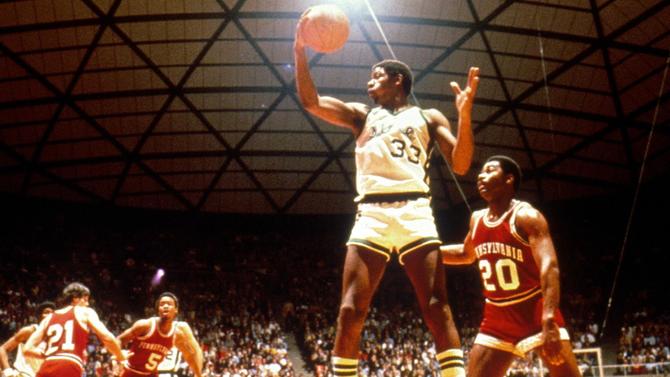
14. Michigan State
Record since 1938-39: 1,375-842 | Regular-season titles: 16
NCAA Tournaments: 33 | Final Fours: 10
Weeks ranked: 469 | Top-60 NBA picks: 44
POINTS: 808.4
Sparty. The rare program to have the benefit of only employing two coaches in the past 45 years. Jud Heathcote begat Tom Izzo. Michigan State fans have it good, and likely will so long as Izzo is running the show. Michigan State has made the NCAA Tournament 22 consecutive times, which trails Duke and Kansas among active streaks and is fourth longest in college basketball history. The Spartans rank sixth in all-time NCAA Tournament victories (69; nice) and have become synonymous with March success thanks to Izzo's 52-21 NCAA Tournament record. In the before times, when Benjamin F. Van Alstyne (sounds like a fake person Kramer made up on "Seinfeld") coached this team from 1926-1949, Michigan State won 231 games and was in the throng of Big Ten powers.
Forddy Anderson got the Spartans into the NCAAs in 1957 and '59, but it wasn't until Heathcote showed up in '76 that things changed for the better. Michigan State has not gone more than three seasons without appearing in the Big Dance since 1988. It won the title with Magic Johnson and Greg Kesler in '79 in what's arguably the most important game in college basketball history -- and also the most-watched game ever in the sport (35.1 million viewers). The Spartans have 214 wins over ranked opponents, the seventh-most ever. . MSU can hold up its greats alongside just about any other program: Johnson, Kesler, Scott Skiles, Steve Smith, Shawn Respert, Mateen Cleaves, Morris Peterosn, Jason Richardson, Kalin Lucas, Draymond Green, Denzel Valentine, Cassius Winston and a dozen more.
13. Arizona
Record since 1938-39: 1,457-808 | Regular-season titles: 24
NCAA Tournaments: 35 | Final Fours: 4
Weeks ranked: 550 | Top-60 NBA picks: 53
POINTS: 827
If Lute Olson never leaves Iowa to coach Arizona, it's possible to think U of A doesn't crack the top 30 on this list. But Olson changed the trajectory of a program. He was one of many Hall of Fame coaches we lost this year, and his influence was undeniable in the desert. The Wildcats own 10 wins over No. 1-ranked teams and became Point Guard U due to recruiting guys like Steve Kerr, Damon Stoudamire, Mike Bibby, Jason Terry, Gilbert Arenas, Jason Gardner, Salim Stoudamire and Jerryd Bayless. Olson had Arizona in the NCAAs every season from 1985-2009. Arizona is 13th on this list and it's 13th in most victories ever (1,834). Obviously UCLA is the best team in the history of the Pac-12/10/8, but Arizona is a very close No. 2. Fred Enke won 509 games (1925-1961), though Arizona only made the NCAA Tournament once and the NIT twice in his tenure.
Like I said above, Olson changed it all. He's the best coach in the history of the Pac-10 and won 589 games for Arizona, even holding a 71-game home winning streak at one point. The '97 title-winning team is still the only one to beat three No. 1 seeds in the same tournament, though you could easily make the case that the '87-88 team with Kerr, Sean Elliott, Jud Buechler, Kenny Lofton (yes, the baseball player) and Tom Tolbert is the best team in school history. That group finished 35-3. Elliott was a two-time consensus All-American, and Stoudamire, Bibby, Miles Simon, Jason Terry, Nick Johnson and Deandre Ayton join in him in that company. Sean Miller has run the show in Tucson since 2009, and there's been off-the-court drama, but Arizona kept its relevancy for much of Miller's tenure by making three Elite Eights, two other Sweet 16s and having a few recruiting classes land in the top five. Miller continued what Olson built, and it's a testament to this program's longevity given that its reputation prior to winning it all in 1997 was that of a March paper tiger, due to how many times the highly seeded Wildcats didn't make the second weekend.
12. Ohio State
Record since 1938-39: 1,312-792 | Regular-season titles: 20
NCAA Tournaments: 33 | Final Fours: 11
Weeks ranked: 412 | Top-60 NBA picks: 44
POINTS: 831.7
It's amazing to consider how good Ohio State's basketball program has been for the better part of seven decades, and yet it will forever pale in the shadows against Buckeye football. OSU hoops isn't considered a top-10 job in the sport, but all things considered, maybe it should be? All of the resources with a fraction of the pressure. A great city that's not too small, not too big, and placed within driving distance of so much talent. OSU has the most Final Four appearances of any Big Ten program. It won the title in 1960 with Jerry Lucas and John Havlicek in going-away fashion, with each win by a margin of at least 17 points. Lucas is, in full, the best player in school history, a three-time consensus All-America. Others who earned the honor from Ohio State: Gary Bradds (1964), Jim Jackson (1991, '92), Evan Turner (2010), Jared Sullinger (2011, '12) and D'Angelo Russell (2015).
Harold Olsen (255 wins) and Fred Taylor (297) fall in line behind Thad Matta, who is the undisputed GOAT of Ohio State basketball coaches. Matta made Ohio State a top-10 program during his 2004-2017 tenure, 337-128 and getting the Buckeyes to the 2007 title game and 2012 Final Four. He recruited studs Greg Oden, Mike Conley Jr., Daequon Cook, Mark Titus and Turner into the fold and put Ohio State into the conversation as a top-10 program. Taylor had the longest tenure of any Ohio State coach, and the 1960 title still looms large there, but Matta easily exceeded expectations. OSU has 20 regular-season titles and owns 173 wins over ranked opponents in the past 70 years. The 2000 Final Four run (under Jim O'Brien) as a No. 8 seed was later vacated, but it counts in the tally for us.
11. Syracuse
Record since 1938-39: 1,467-704 | Regular-season titles: 10
NCAA Tournaments: 40 | Final Fours: 6
Weeks ranked: 550 | Top-60 NBA picks: 52
POINTS: 873
Jim Boeheim would never take sole credit for this, but let's come correct: He's more responsible for his team's placement on this list than any coach at any school. That's because Boeheim has set a men's Division I record for longest affiliation with any school in history. He played at Syracuse, and when you include his playing days and time as an SU assistant, Boeheim has spent all but nearly three years of his adult life at SU. Fifty-four of his 76 years on this soil involve him with the program. He is Orange through thick and thin -- and yes there have been controversies, highs and lows and chapters upon chapters of SU hoops history. He is that program, through thick and thin -- and yes there have been controversies, highs and lows and chapters upon chapters of Orange hoops history. He's won 1,069 games in 44 seasons (though more than 100 have been taken off the books).
Syracuse's home venue, the Carrier Dome, is also part of the viewing tapestry of college hoops, as the stadium has been the reason the school has led in attendance in most years over the past three decades and is unique to the sport. The basketball team plays there, as opposed to a traditional facility, in part because the football team for decades wasn't popular enough to sustain it being a football-only venue. Your SU consensus All-Americans since 1939: Dave Bing (1966), Derrick Coleman (1990), Billy Owens (1991), Hakim Warrick (2005), Wes Johnson (2010). No, Carmelo Anthony was not a consensus pick in 2002-03, when he, Gerry McNamara, Warrick and Kueth Duany paced Cuse to its first and only national championship. Pearl Washington also did not crack the list, but he, Anthony, Leo Rautins, Danny Schayes, John Wallace, Etan Thomas, Jonny Flynn, Dion Waiters and Tyler Ennis all were top-20 picks coming out of college. Cuse has a close race for best player in school history: Bing, Anthony, Washington and Coleman are all right there.
10. Cincinnati
Record since 1938-39: 1,542-765 | Regular-season titles: 25
NCAA Tournaments: 33 | Final Fours: 6
Weeks ranked: 434 | Top-60 NBA picks: 39
POINTS: 882.4
A mild stunner in the top 10. Cincinnati may not be a top 25 team heading into this season, but since the 1940s Cincy has routinely provided Final Four-worthy teams, produced pros, been a staple in the AP Top 25 and more often than not worked its way to the top of its conference. The Bearcats have been in 23 of the past 28 Big Dances and managed to keep up with the joneses despite playing conference hopscotch, going from the Missouri Valley to independence to the Metro to the Great Midwest to Conference USA to the Big East and now in the past eight seasons, the American.
No team in this ranking's top 25 has moved around more than Cincinnati, but the school wasn't pinned down by it. That's impressive. UC won the 1961 and '62 national championships -- but it also made the Final Four in '59, '60 and '63. Through the first 15 years of the NCAA Tournament this was one of the five or six best programs in college hoops. Truth is, Cincinnati hasn't fallen off much since then. Oscar Robertson, who was NPOY in 1959 and 1960, is the GOAT of Bearcats. Other legends include Ron Bonham, Tom Thacker, Danny Fortson, Kenyon Martin and Steve Logan -- all consensus All-Americans. Gary Clark and Jarron Cumberland have been big-time guys in recent seasons, but I can't close out this capsule without bringing up Nick Van Exel and Yancy Gates, a couple of guys who define Bearcat basketball as well as anyone.
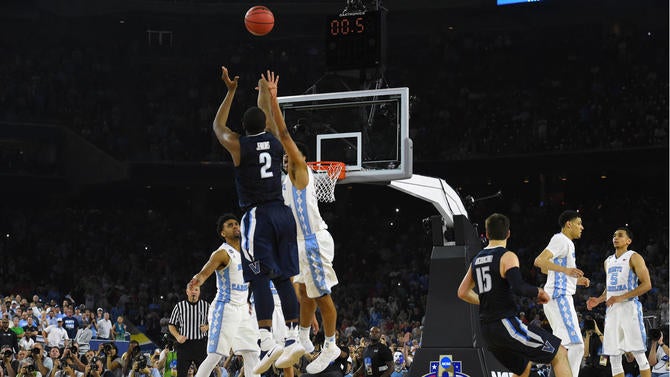
9. Villanova
Record since 1938-39: 1,589-810 | Regular-season titles: 13
NCAA Tournaments: 39 | Final Fours: 6
Weeks ranked: 403 | Top-60 NBA picks: 37
POINTS: 883.8
No team did more for its standings on this list in the past half-decade than good ol' Nova. A modern blue blood? Perhaps more than that. The Wildcats have three national championships (1985, 2016, 2018) and have become an annual preseason top 10 team. Jay Wright has built a Big East dynasty and there is no slowing on the horizon. Villanova's prideful past begins with the 1939 tournament (it was in the Final Four), and it's been super steady since. Coached by Alexander Severance, Nova went 413-201 from 1936-60 under, then had even more success under Jack Kraft from '60-73 and made the NCAAs or NIT every year except his final one, including the NCAA title game in '71.
Rollie Massimino had some tough seasons in the early '70s but by 1980 Villanova was a ranked regular, capping its existence with the unforgettable win in the' 85 championship game over mighty Georgetown. Massimino would win 355 games with Nova, was replaced by Steve Lappas, who went 174-110 and was viewed as a setback. That's really the bar, here. Now Wright is 20 seasons into his Nova career and has a 471-182 record with two national titles, three Final Fours and is in command of the Big East. Consensus All-Americans to wear navy blue and white: Paul Arizin, Kerry Kittles, Randy Foye, Scottie Reynolds, Josh Hart and Jalen Brunson. Other all-time Villanova greats include Kerry Kittles, Ed Pinckney, Tim Thomas, Allan Ray and Kyle Lowry.
8. UConn
Record since 1938-39: 1488-784 | Regular-season titles: 31
NCAA Tournaments: 33 | Final Fours: 5
Weeks ranked: 344 | Top-60 NBA picks: 37
POINTS: 887.4
Storrs, Connecticut, can now claim to be home to one of the 10 best programs in college basketball history on the men's side -- and certainly the best in women's hoops. This means UConn is the best basketball school in America from a historical perspective. The Huskies have won 31 league titles, a hefty portion of those coming back during the Yankee Conference days. When you think back to the 1990s, a few programs stand out for how they broke through to a new status in the sport. UConn is at the top of the list. Jim Calhoun redefined what was possible at this northeast outpost when he arrived from Northeastern in 1986 and flipped the Huskies into a national power in a little more than a decade's time.
But UConn wasn't only good with Calhoun. It made the NCAAs in '51, '54, '56-60, '63-65, '67, '76 and '79. So there was something there. Calhoun just cracked open a behemoth and had some of the top talent from around the country opting into playing in a farm town tucked deep in the heart of Connecticut. UConn's win over Duke in the 1999 championship game is the pivot moment where things changed forever, guided by Richard Hamilton, Khalid El-Amin, Kevin Freeman and Ricky Moore, Duke was the presumptive pick to win with one of its greatest rosters ever -- but no. Since then, the pros have poured through the program and UConn's won three more championships (2004, 2011, 2014). The Huskies claim six consensus All-Americans: Donyell Marshall, Ray Allen, Hamilton, Emeka Okafor, Kemba Walker and Shabazz Napier. All but a few of their NBA picks have come in the past 30 years. The Huskies linking back up with the Big East was a major positive for the program, that league and college basketball. Calhoun probably won't ever be usurped as the school's best men's coach in history, and Kevin Ollie deserves a nod for winning that unexpected title in '14, but Dan Hurley is in a spot now to keep UConn going as a top-25 program. As you can see, the bar is even higher than that.
7. Indiana
Record since 1938-39: 1,476-773 | Regular-season titles: 19
NCAA Tournaments: 39 | Final Fours: 8
Weeks ranked: 560 | Top-60 NBA picks: 61
POINTS: 1,018
And now's about that time where the list hits the predictable schools -- and yet Indiana falling outside the top six of the "traditional" blue bloods means a redefining should be in order. Indiana has long loved its basketball, as a state, as much as any in this country. The Hoosiers are the most important game in town. Bob Knight created an institution in Bloomington, Indiana, winning 659 games vs. 242 losses, and at this point his tallest achievement is that he's the last coach to guide an undefeated team. The 1975-76 Hoosiers went 32-0 one season after the 31-1 squad that lost in the Elite Eight. Knight and IU also won the whole thing in '81 and '87. Indiana was as prominent a program as any in college basketball from 1973 through the mid 1990s. The Hall of Famer had a vicious temper, and dogged stubbornness cost him his job in the end, but he's still beloved by plenty in the Hoosier State. His influence on basketball is forever there with the innovative motion offense. He has a quote that should stand taller than all of his others when it comes to basketball: "Basketball may have been invented in Massachusetts, but it was made for Indiana."
The Hoosiers were good before Knight arrived, naturally, winning 399 games from 1938-65 under Branch McCracken and Harry Good, the team's first national title happening in 1940 and its second in 1953. The list of Hoosiers greats is mighty long, but the consensus All-Americans are a cut above: Ernie Andres, Ralph Hamilton, Don Schlundt, Scott May, Kent Benson, Isiah Thomas, Steve Alford, Calbert Cheaney, A.J. Guyton, Victor Oladipo. The Hoosiers have taken a step back in the past two decades, though Mike Davis got the team to the title game in '02 and Tom Crean helped the program find its footing after NCAA sanctions under Kelvin Sampson slowed momentum. Archie Miller was a widely praised hire in 2017 and his teams have been better every year since.
6. Louisville
Record since 1938-39: 1,578-724 | Regular-season titles: 23
NCAA Tournaments: 43 | Final Fours: 10
Weeks ranked: 652 | Top-60 NBA picks: 55
POINTS: 1,082.2
Louisville ahead of Indiana -- and the race wasn't too, too close. While the Hoosiers have bobbed and weaved in the near-20 years since Knight left IU, Louisville has made multiple Final Fours, won the 2013 national championship (which was vacated, but again: we are counting all those wins here) and managed to maneuver from the Big East into the ACC and not lose its footing nationally. Rick Pitino's exit was extremely messy and filled with controversy. But this is a program that's yet to have a bad coach dating back to the early 1940s. Peck Hickman went 443-183 from 1944-67, then John Dromo was there and out in four seasons but still won 75% of his games (68-23).
Denny Crum left his job as an assistant coach UCLA in 1971 to guide the Cardinals and pushed U of L into the top tier of college basketball. Crum coached for three decades (675-295), won two national titles and had Louisville as competitive as just about any program in the 1980s. He was succeeded by Pitino, who flamed out with the Celtics only to return to college basketball and prove he had not lost a step. Charlie Tyra, Wes Unseld, Darrell Griffith, Pervis Ellison, Clifford Rozier and Russ Smith were consensus All-Americans. The best team in school history figures to be that '80 title-winning squad with the Doctors of Dunk, led by Griffith. Did you know: local legend has it that the "high five" was popularized first by Cardinal hoops, sometime around the late 1970s. From the Missouri Valley to the Metro to Conference USA to the Big East, a pit stop in the American, and now in the ACC. I mentioned Cincinnati's league-by-league hopscotch above, and Louisville's really the only school to best that. The program seems to be in great hands now with Chris Mack, who came by way of Xavier and hasn't seen a dip so far.
5. Kansas
Record since 1938-39: 1,809-654 | Regular-season titles: 42
NCAA Tournaments: 48 | Final Fours: 15
Weeks ranked: 786 | Top-60 NBA picks: 62
POINTS: 1,459.1
There are programs that rank higher, but in terms of pure college basketball history, does any school have more star power and icon allure than Kansas? Here's a laundry list of names associated with the program in the past 120 years: James Naismith, Phog Allen, Adolph Rupp, Dean Smith, Ralph Miler, Wilt Chamberlain, Larry Brown, Roy Williams, Bill Self. There's plenty of others, but that is so much college basketball history in and of itself. Kansas does not rate as the best program of all time but it's at the top of the list for having the most distinguished and accomplished names in the history of the sport. Amid all the records and achievements, the most outrageous one to me is still Self winning 14 straight regular-season titles (2005-2018). I don't think that will be duplicated at the power-conference level in the next 100 years.
Amid all this dominance, it's still surprising to know that KU has "just" three national championships (1952, 1988, 2008) but the Final Four runs outside of that are plenty (12) and KU's 107 NCAA Tournament wins are fourth most in history. Kansas has made 30 straight NCAA Tournaments, a record, and has 240 wins over ranked opponents. Consensus All-Americans: Howard Engleman, Charlie Black, Clyde Lovellete, Chamberlain, Danny Manning, Raef LaFrentz, Paul Pierce, Drew Gooden, Nick Collison, Wayne Simien, Thomas Robinson, Frank Mason and Devonte Graham. The list of outstanding Jayhawks requires multiple pages, frankly. Who's the best coach in school history? Allen has the building named after him -- and it might be the best venue in college basketball -- but Self's dominance in the modern era can't be usurped. Allen won 590 games, Self is sitting at 501, so he'll need almost five more seasons to catch him. The fans also have a long tradition of bringing out the most haunting cheer/taunt in college sports: Roooooooock / chaaaaaaaalk / Jaaaaayhaaaaaawk / Kayyyyyy-youuuuuu.
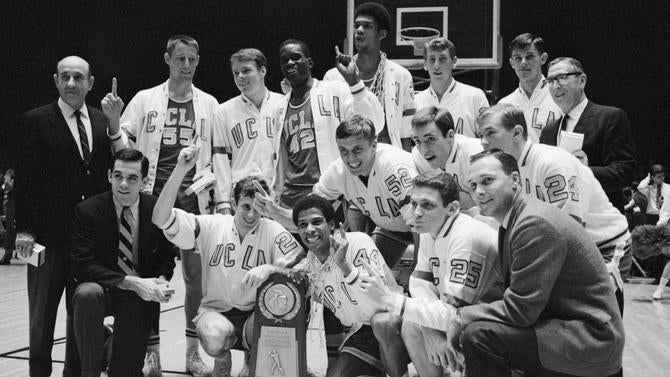
4. UCLA
Record since 1938-39: 1,732-725 | Regular-season titles: 31
NCAA Tournaments: 49 | Final Fours: 18
Weeks ranked: 695 | Top-60 NBA picks: 83
POINTS: 1,474.5
John Wooden built a monolith of success and created a dynasty, the likes of which will never be seen again in men's Division I basketball. The Bruins won and won and won and became one of the biggest stories in sports from the mid-1960s all the way through 1975, when Wooden surprisingly retired after winning his 10th and final championship. That's a coaching record in men's basketball that seems near-impossible to break at this point and for the centuries to come. UCLA has 17 wins over No. 1-ranked teams in its history, and Wooden's era alone does not represent why UCLA is No. 4 all time in college hoops. The Bruins won a championship in 1995 under Jim Harrick and made three straight Final Fours -- a rare feat in the post-Wooden epoch -- from 2006-08 under Ben Howland. This season, UCLA might prove to be the best team in the Pac-12 again, doing so after rallying in its first season under Mick Cronin to tie for the conference championship.
Flashing back, though, it does start with the Wizard of Westwood. UCLA was nothing before he arrived, and then it created the greatest dynasty in college basketball history. Lew Alcindor and Bill Walton might be the two best players ever in college hoops -- and they were separated by three years at UCLA, back when freshmen were not eligible. Wooden won 620 games and coached from 1948-75. His image and impression were so daunting, UCLA became viewed as an underachiever in the near-two decades after his retirement, even though the Bruins frequently made the NCAA Tournament and all its coaches were easily above .600 in win percentage. Wooden didn't alter the dynamic, he was the dynamic. I've made sure to list each team's consensus All-Americans since 1939 in every capsule of this ranking, but we're reaching the point where these top teams have close to or more than 20 guys. Some of the best to wear Bruin gold: Walt Hazzard, Gail Goodrich, Alcindor, Sidney Wicks, Walton, Keith Wilkes, Marques Johnson, David Greenwood, Ed O'Bannon, Kevin Love, Lonzo Ball. All consensus A-As. Of course this is also the alma mater of Reggie Miller, Russell Westbrook and Toby Bailey!
3. Duke
Record since 1938-39: 1,848-683 | Regular-season titles: 22
NCAA Tournaments: 43 | Final Fours: 16
Weeks ranked: 833 | Top-60 NBA picks: 78
POINTS: 1,487.8
When Mike Krzyzewski took the Duke job in 1980, at the age of 33, he was coming from his alma mater, Army, and there were no visions of conference dominance. In fact, Krzyzewski was on the hot seat three seasons in (38-47) and some fans wanted him out, but then-athletic director Tom Butters stuck with his coach. That act of patience from an AD wasn't uncommon in 1983, but in modern times it's easy to see how it could have gone differently. Thankfully for Duke and Kryzyzewski the decision to stay the course resulted in what could be argued is the greatest coaching career in men's college basketball history. Before Krzyzewski, Duke had its share of good times, though. He made Duke the most popular -- and polarizing -- program in the sport, but from 1940-1979 Duke made eight NCAA Tournaments and four Final Fours. Its best coach was Vic Bubas (213-67), who was in charge from 1959-69. Duke was a good ACC program. Under Coach K, it's a platinum college basketball power. To date Duke has 29 wins over No. 1-ranked teams, which is the most in college basketball. Its 114 NCAA Tournament wins ranked third all time. It has 316 wins over ranked opponents and its 1,848 wins are third most since 1939.
Krzyzewski's won 1,084 games at Duke and been to the Big Dance all but four seasons of his career. His five titles trail only Wooden's 10 NCAA championships -- but he's thrived when getting to the Final Four has been tougher, the sport's talent pool is more spread out than ever and the competition remains cutthroat. Hell, Wednesday's NBA Draft marked the first time in 10 years a Duke player failed to be picked in the first round. That's an amazing run. Duke's had 80 players go in the top 60 picks (and exactly 100 overall) in NBA history. Consensus All-Americans have been a regular thing in Durham for 35 years, the biggest names being Johnny Dawkins, Danny Ferry, Christian Laettner, Grant Hill, Bobby Hurley, Shane Battier, Jason Williams, J.J. Redick, Jahlil Okafor, Marvin Bagley III, RJ Barrett and Zion Williamson. Duke is the biggest program in college basketball because it draws the most emotion from the sport's fans. Lots of love, lots of hate, but no larger TV draw than the school with four letters led by a man referred to with just one: K.
2. North Carolina
Record since 1938-39: 1,890-663 | Regular-season titles: 35
NCAA Tournaments: 50 | Final Fours: 20
Weeks ranked: 923 | Top-60 NBA picks:75
POINTS: 1,682.3
Take it, Carolina fans. Your team beat Duke by 195 points. There's just a bit more history, a little more NCAA Tournament success, a few more wins vs. ranked opponents and four more Final Four showings. This is college basketball royalty in its most elegant form. It's fair to say that between Dean Smith and Roy Williams -- who have combined for six tournament titles and 1,764 career wins -- no program has a better 1-2 of coaches than UNC. The Tar Heels won their first title in 1957 by going 32-0 under Frank McGuire, with Lennie Rosenbluth and Pete Brennan guiding the way. The next championship didn't happen until a guy named Jordan hit a shot with 17 seconds to go against Georgetown in '82. But MJ wasn't even UNC's best player; he was a freshman understudy, playing third fiddle at best to James Worthy and Sam Perkins.
Smith was the conscience of college basketball for more than three decades, and since his passing in 2015, Smith's reputation has only swelled due to his humanitarianism and fight for racial equality years before those things were discussed and consistently fought for inside and outside the world of sports. The Tar Heels claim 23 victories over No. 1-ranked teams. They have 126 NCAA Tournament wins. Their 339 victories against ranked opponents is far and away the most in college basketball history. And in the historically great ACC, 35 regular-season titles puts Duke's 22 to shame. Also a record: 20 Final Fours. No school tops that. The same goes for Sweet 16 appearances: UNC claims 34 of them. No program has been better at cultivating more really good NBA players, either. When you've got Jordan, you've got the winning hand. But here's a slew of other consensus All-Americans to play in Chapel Hill: Bob McAdoo, Phil Ford, Worthy, Perkins, Kenny Smith, Jerry Stackhouse, Antawn Jamison, Tyler Hansbrough, Brice Johnson. Then you've got Vince Carter, Raymond Felton, Sean May, Ty Lawson, Rasheed Wallace -- just stud after stud.
At one point UNC made 27 straight NCAA Tournaments, a record only recently broken by Kansas. Smith is still considered the greatest coach in UNC history but Williams has more national titles and is a 1B at worst. North Carolina and Duke have kept each other in the top three in many ways, but there is no birthright or guarantee to this. Williams took over at a point in 2003 when UNC was starting to slump. He won a national title in two years. Those 2005 and '09 championship teams have a case to be just as good as the '82 champs.
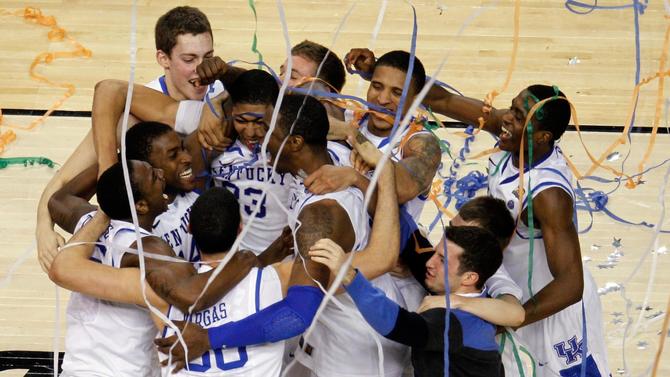
1. Kentucky
Record since 1938-39: 1,984-540 | Regular-season titles: 47
NCAA Tournaments: 59 | Final Fours: 17
Weeks ranked: 918 | Top-60 NBA picks: 100
POINTS: 1,931.8
Kentucky is blowing away this field with 1,931.8 points. The difference, really, is the SEC championships and the NBA talent John Calipari has recruited to the Bluegrass State for the past decade. It's astounding. Kentucky is unequivocally the most successful and consistent program in college basketball in the past 10 years, the past 20, 30, 40, 60 and even 80 years. UK's 131 NCAA Tournament wins: most ever. Its 2,320 wins in history: most ever. How about this: it has made 21 Elite Eights NOT including the years it also went to the Final Four, which adds another nine to that pile. By far the most ever. Kentucky's 102 top-60 NBA picks since 1946: most ever. It's been ranked for 919 weeks, tops in college basketball history. The 59 NCAA Tournament bids outpaces No. 2 North Carolina by NINE. Its domination of the SEC is silly; those 47 regular-season titles, in addition to 17 Final Fours, catapulted Kentucky past the competition.
Adolph Rupp won 876 games and built Kentucky into a college hoops colossus. When he retired in 1972, he'd won four national titles and had UK as the No. 2 program in the sport behind UCLA. Joe B. Hall took over, won a title in '78 and got to 297 wins. Eddie Sutton had success that was tarnished by rule-breaking, and so in swooped Rick Pitino to provide college basketball with its most entertaining team of the 1990s. The 1995-96 Kentucky team that went 34-2 and won the title is on the Mount Rushmore of greatest teams in history and is probably the best non-undefeated team to ever win it all.
Tubby Smith took over after Pitino left for the NBA, won a championship with Pitino's players in '98, and kept Kentucky atop the sport for most of his time. And now we have Calipari. I said UNC has the best 1-2 coaching combo ever, and that's true. But Kentucky by far has the best trio of elite coaches in basketball history: Rupp, Pitino, Calipari. Since 2009, Calipari has redefined how to recruit and thrive in college hoops, peeling off the greatest run of pros in college basketball history. Including Wednesday's draft, 44 players have come out of Kentucky the last 11 seasons and been drafted. UK has made more Final Fours than any school in Calipari's tenure and won the national title with another all-time great team in 2011-12. The list of absurd talent to play in the Commonwealth would require a chapter unto itself, so here's a dollop: Alex Groza, Ralph Beard, Cliff Hagan, Dan Issel, Jamal Mashburn, Tony Delk, Ron Mercer, Tayshaun Prince, John Wall, DeMarcus Cousins, Anthony Davis and Tyler Ulis. While college basketball has an impressive group of blue bloods sitting at its table, only program belongs at the head: Kentucky.
Greatest College Basketball Teams Ever: Nos. 26-50 | Nos. 51-68













